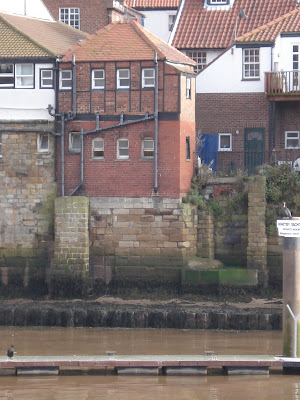Oh, I loved Whitby. I hadn't realised, until I got there, how much I had missed the sea! And what a sea...
It was a case of seizing the day - a promising forecast wedged between snow and heavy rain that had tragically caused one woman's car to be swept away on the North York Moors just the previous day. So an early start from York to Malton, on to Pickering and then up onto moors that were nearly black and truly lonely, made all the more menacing by a structure that warrants a separate post.
The ruins of St Hilda's Abbey dominate the Whitby skyline.
I parked high on the hill near the Abbey. The first thing I heard, apart from the sea, was the cry of gulls - a constant throughout the day. I circled round the Abbey and the adjacent church of St Mary, with its graveyard fully exposed to the sea, and caught my first view of the river, harbour and town.
Down the 199 worn stone steps (up which coffins were once carried to the church) and across the swing bridge. Whitby was already busy with people, many of them kitted out in walking gear. Lots of dogs and children - a day by the seaside. There were also the inevitable pier entertainment arcades.
A fascinating little Lifeboat Museum which gave an all too vivid insight into the dangers of the coastline and the bravery of the men who have operated the lifeboats over the centuries. Then out onto the harbour walls which were exerting a magnet-like attraction! Even on a fine day the sea was heavy and crashing with huge force into the walls - very dramatic.
Despite a heavy padlocked gate that prevented access to this part of the wall (below) there were men out at the far end fishing. Later I saw two locals with rods climb over the stone wall at the side of the gate!
Up the hill on the other side of the town to the Captain Cook Memorial. I had an unexpected rush of pride when I read the plaques (there were four) on the memorial.
From here you look down to the harbour (see above) and back across the river to the Abbey and St Mary's and the pantile-roofed houses tumbling down to the sea.
I walked further up river to the dry dock, thinking about what a hive of activity Whitby would have been in Captain Cook's day when it was a major boat-building and fishing town. Still lots of evidence of fishing as well as recreational boating.
A visit to the very fine Captain Cook Museum, in the house where Cook lived as an apprentice ship boy. The house typical of the 'high-rise' Whitby buildings where flat land was scarce.
A wander past the last remaining Whitby jet works and then back up the 199 steps to the Abbey and car and a return home across the moors at dusk, very satisfied and full of sea air.






























































